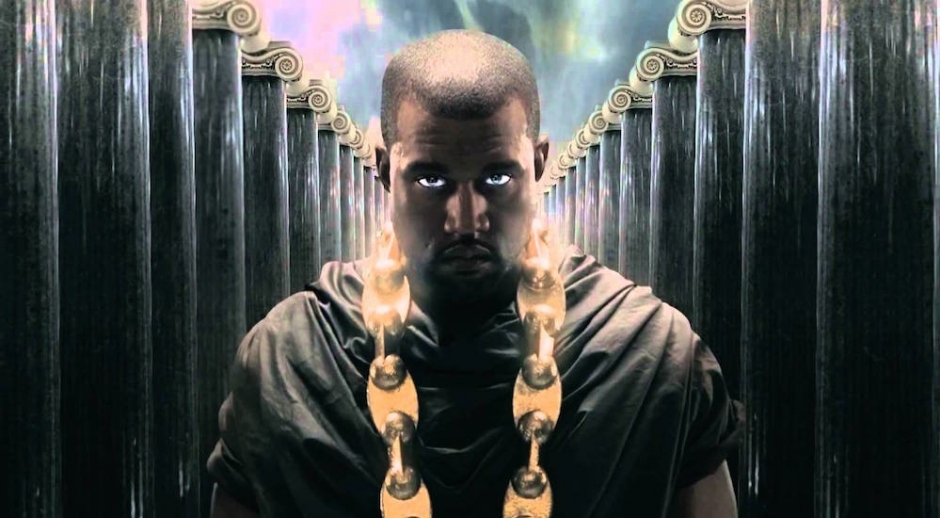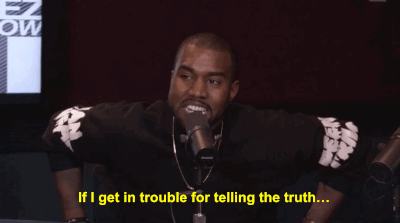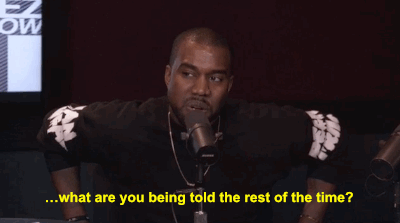 Ta-ku: Searching For Harmony In CreationA true jack of all trades in the creative world.
Ta-ku: Searching For Harmony In CreationA true jack of all trades in the creative world.

Hip Hop Academic: Understanding Kanye West
Breaking down some of Yeezy's most famous and misunderstood 'rants'.
Hip Hop Academic is a new series highlighting the studies of both hip hop culture and hip hop music, as a means to understand life, love and everything in between. Part One begins below.
-
Kanye West is renowned in many ways, lately more for his so-called 'rants' and ‘erratic’ behaviour than his music. Despite The Life Of Pablo being successfully released and warmly received by a great many, much of the attention paid to Kanye West, contemporarily, focuses on attempting to disparage him and dismiss his many tangents and/or speeches as crazed, feverish examples of West's arrogance, and speculated mental illness - as opposed to profound examples of the artist within him fighting, scrapping and brawling to break free.
In the wake of the divisive Kanye West's recent 39th birthday, I humbly present a case to argue for Kanye West, and his supposed 'rants', as being equally as inspiring as they are misunderstood. And that the man himself is, indeed, precisely the same.

Kanye West - Ellen Interview (2016)
"I'm sorry for the realness," Kanye concludes, in his latest ‘rant’ on Ellen Degeneres' daytime talk show. As so often Kanye's rhetoric does - he speaks of inspiration, aspiration and defiance against restrictions and constructs which have historically been so constrictive on the forward movement and thinking of society, and particularly art, creativity and innovation. In many ways, Kanye's words in such 'rants' oftentimes reflect the direction, or directions, that his music has taken throughout the span of his career. Though primarily understood to be a 'hip hop artist', Kanye West's music has often defied the constraints of genre which many artists find their music suffering and struggling against, perhaps most specifically on West’s groundbreaking 808s & Heartbreak, released in 2008 and promptly helping to spawn the careers of numerous artists now considered superstars amongst their respective genres. Evidence, certainly, that Kanye West is, and has always been, as ambitious and successful as his music is.
"Talk about how many times you've been blocked from being able to excel," Kanye says, recalling a conversation he shared with comedian Chris Rock, "I didn't take it is a joke."
"Don't tell me about being likeable," West continues, before going on to implore listeners and to implore fans that they are, indeed, a part of the one race - this human race, "And we constantly trying to pull each other down. Not doing things to help each other."
"I feel that I can make things better through my skill set," Kanye strains to say, shaking as he implores his audience to understand the full extent and gravity of his ambitions, in addition to the profound sincerity of his compassion and care for them. Commonly, of course, much of the focus and coverage is often placed upon the assumed 'arrogance' of Kanye in openly valuing his own skill set, and comparatively very little talk and attention is given to the charitable ambitions that Kanye so passionately communicates. In this sense, perhaps the perceptions of Kanye West are endemic of common societal attitudes, where the negatives are seemingly perceived to be far more noticeable (or at least focused on) than the positives.
Why else would a man explaining at great length about how much he cares, and about how much he encourages personal fulfilment and empowerment, still be popularly regarded as both arrogant and selfish?
Kanye West - Wireless Festival, London (2014)
"How many people tonight with a show of hands think they are fucking awesome?" Kanye asks, to cheers from the crowd watching on in awe, "Now with a show of hands: How many people tonight have had people tell you your whole life that you wasn’t fucking awesome?"
The crowd cheers again, outlining and demonstrating the importance of Kanye's ultimate message. Or, foraying even further and deeper, revealing a largely unseen element to Kanye's message. As much as it is about Kanye empowering himself through his own words and through his own music, it rings true that it is as much, if not perhaps more, about empowering the world around him. Kanye West often speaks up against classism (to an extent where his mere celebrity position in society draws criticism) as a means of arguing for the annihilation of the constructs. Or more to the point Kanye made here, a means of disparaging all of the voices daring to say you're not fucking awesome, or that we aren't fucking awesome. After all, the narrative we follow within ourselves has gradually changed from ‘you can do anything that you put your mind to’ into something far more dismissive, akin to ‘you can only do so much’.
"You know, I just want to make something awesome. I just want to be awesome, and I want to hang around my awesome friends and change the fucking world, and that’s exactly what I plan to do," Kanye offers to his adoring crowd, "And if you plan to do the same, put your hands in the air right now."
Suddenly, it seems, the image of the arrogant Kanye - the inaccessible Kanye - begins to fade away. Kanye's prevailing message is laid bare to reveal that, despite popular belief, it is not about Kanye singularly, but rather about change. It is about empowerment, albeit his own at various times but still predominantly it becomes clear that the call to empowerment reaches further beyond just the man known as Kanye West. And furthermore, that is precisely how he wants it to be.
“...change the fucking world…”
Kanye West - Barclays, Brooklyn (2013)
"He said, 'I don't approve of your methods in your interviews lately.' He said he only saw one person before who ever really pulled this off and that was Muhammad Ali," Kanye begins, referring back to a conversation he had with a supposed billion-dollar company owner. Perhaps this line may well have a greater impact now, some years after Kanye said it, given the recent passing of the aforementioned Ali. But the comparison, while they are different men having done vastly different things, may well be an astute one, and one with great meaning.
How? Or, rather, why? It is certainly visible and clear to open eyes that Muhammad Ali broke ground in a unique way. Perhaps what is less obvious is that, in doing so, Ali blazed the trail which Kanye West has now taken up as his own. While appearing outwardly over-confident, perhaps, to the point of arrogance, studying the actions of both Ali in his prime years and Kanye West's own career reveals actions far more leaning towards defiance. After all, Ali's boxing prime spanned years where African-American Civil Rights were in a violent stage of change, and to many, Ali was instrumental to the progress of the equality cause through both his successes and his actions.
After all, at the time, Muhammad Ali was the face of boxing, and in the 1960s, particularly, an African-American being the face of anything was an astronomically enormous deal, perhaps far beyond the comprehension of contemporary society. Not only that, but the man born Cassius Clay openly changed his name to Muhammad Ali as an outspoken means of shedding his 'slave name', and ties to the oppressive slave origins of the African-American race in America. Furthermore, and from which Kanye West can draw the bulk of his similarities to the famous athlete, Muhammad Ali was defiantly outspoken. Take, for instance, Ali's response to his conscription for service in the Vietnam War, 1967:
"I'm not gonna help nobody get something my negroes don't have. If I'm gonna die, I'll die now right here fighting you, if I'm gonna die. You my enemy. My enemies are white people, not Viet Congs or Chinese or Japanese. You my opposer when I want freedom. You my opposer when I want justice. You my opposer when I want equality. You won't even stand up for me in America for my religious beliefs, and you want me to go somewhere and fight, but you won't even stand up for me here at home.”
"And if I've got the voice and I've got the opportunity to turn up in these interviews, I just have to look and say, 'What do I have to lose?' What do I have to lose? We only have everything to gain. So don't ever let them make you think for one moment that I'm going insane. Because I sit back and see shit and think 'Am I the only one that's not crazy?' But every celebrity is so goddamn scared of losing everything, that they won't ever say nothing to you," Kanye West offers, in a statement admittedly far less profound and ultimately meaningful than Muhammad Ali’s, but nonetheless inarguably similar with regards to its ultimate meaning. The key offering by Kanye in this example would, and is, undoubtedly that in which he asks what he has to lose.
Muhammad Ali, career-long, ran under this same banner of thinking. Considering themselves men with nothing to lose, but nonetheless perpetually aware that losses will come and what can be gained from them, Kanye West and Muhammed Ali share a common defiance against constructs and constraints daring to think of holding them. Or, perhaps especially, daring to think of limiting the reach of their ultimate goals and ambitions. On losing, Ali had this to say:
"I never thought of losing, but now that it's happened, the only thing is to do it right. That's my obligation to all the people who believe in me. We all have to take defeats in life."
Everyone has made mistakes. I just make them in public.
Kanye's comparison to a noted fighter (perhaps the greatest ever) is no mere slip of the tongue, nor is it an oversight. Though without question fighting different fights (even if some of them may well be, regrettably, the same), both Muhammad Ali and Kanye West define the term ‘fighter’. Further, they define the term defiance. And confused by the hysteria of public perception, their defiance is thought, instead, to be unabashed arrogance. Of course, we now harbour the ability to acknowledge that the overall perception of Muhammad Ali eventually changed, and so one must be forced to wonder if the same courtesy will await the fighter that is Kanye West. A man fighting for his own dreams, and those of the people around him.
"These dreams keep me up at night."
Kanye West - Tampa, Florida (2013)
"You know it's like, have you ever felt out of place ever, like, out of context like someone just didn't understand, like they just didn't understand what you wanted to do, what you was trying to do, or what, or what you was dreaming of," Kanye sings, touching again upon the concept of dreams, a recurring theme of a considerable amount of Kanye's ongoing rhetoric, and art, "Have you ever, have you ever been scared to say, to say your dreams out loud?"
In so many ways, the continuing message of Kanye West recalls a long-standing struggle. Not only the most obvious, with respect to the struggle and the fight for equality, but also the struggle to dream. The struggle for hope. Kanye has been outspoken in asserting the fact that we are all, as one, of the same human race, and we as a people are forced, in many ways, to see that West’s struggle for hope is quite a universal one. So, too, is the struggle for achieving dreams. It recalls a curious comparison, one sure to raise many an eyebrow, to icon of America's Civil Rights movement Martin Luther King, Jr's landmark 'I Have A Dream' speech.
While no argument would ever attempt to suggest that Martin Luther King, Jr was not championing, specifically, the equal rights of African-Americans, it was equally true that Martin Luther King, Jr was a champion for all people, and proud in being so. In that sense, it is no wonder why his untimely loss as a result of assassination is still regarded as one of the more tragic moments in history. Yet still, it is a message seemingly lost amongst time that Martin Luther King, Jr was this profound warrior for all people, of all colours and races. Take for instance, a portion of his famous 'I Have A Dream' speech in 1963, where words 'hope' and 'together' are notable stand outs.
It echoes sentiments told by modern icon and cultural pariah Kanye West, who follows a similar vein in his message with the promotion of a 'one is all, and all are one' method of thinking.
"I had a dream. I had a dream that I was Steve Jobs. I had a dream that I was Walt Disney. I had a dream that I was The Wright Brothers. I had a dream that I was Thomas Edison. I had a dream that I was Mandela. I had a dream that I was Martin Luther King. I had a dream, I had a dream, I had a dream," Kanye offers, "And I'm not afraid to dream out loud. You know you just get so scared that people are gonna think you're crazy, or that you're stupid, or that you're foolish, or this is the time that everybody thinks you're losing your mind, but I'm not losing my mind, I'm using my mind!"
Of course the distance between the two men's motives, methods and existences are particularly considerable, without question. Regardless, the comparisons are seen to not even remotely be outlandish. Both men fought for people, and as with the comparison to Muhammad Ali, Kanye West proves himself almost every bit as much the fighter that Martin Luther King Jr was, and died as.
"I'm talking about all the tools they use to hold dreamers back, to make them look like motherfucking lunatics," Kanye sings on, speaking further on bursting through the constructs and constraints to reign in the boundless dreams and ambitions of himself and us all, "Put your hands up if you think anything is possible."
"So don't let nobody kill your dreams, don't let nobody tell you what you can do. Cause the more you accomplish, the more they wanna say you look like a fool."
Kanye West - Madison Square Garden, NY (2013)
But of course, Kanye West is like any one of us. He is not infallible, or indestructible, and has never expressed any desire to convince anybody that he is, or might be - despite his defiance, and courage.
"I’m scared of anonymous comments online. I’m scared of them. These words affect me so much. They affect me so much. No, I’m sorry. I’m scared, I’m scared. I’m scared of these corporations, like, not giving me another deal that they didn’t give me already. I’m scared. I’m scared. I’m so shook. I’m so, so scared. So scared."
And it is an important fact to know, since it is that fear drives so much of life, and so much of achievement. Which, if there is one thing that Kanye West wants more than anything, it is achievement. His achievements, and our achievements.
"Cause everybody has a moment. And in your moment you gotta own it. There’s so many people have a moment and they don’t own it."
Kanye West - 'Album of the Year' Grammy Acceptance Speech (2005)
Kanye, himself, has always been one to accept his moment — and to embrace it.
"When I had my accident, I found out at that moment nothing in life is promised except death. If you had the opportunity to play this game of life, you need to appreciate every moment. A lot of people don't appreciate their moment until it’s passed," Kanye says, recalling the car accident of October 2002 which almost took Kanye's life. An accident which, in turn, inspired Kanye's Through The Wire, the lead single from The College Dropout, for which Kanye received his 'Album of the Year' Grammy.
Kanye West - A Concert for Hurricane Katrina (2005)
But for all that Kanye does to seize and achieve his own moment, he has proven at every single turn that he is unafraid to lose that moment, for something that he believes in. He has the voice to speak, and remains one of the only living people — celebrity, or otherwise — to demonstrate a true and sincere willingness to use that voice, at whatever risk or cost may arise.
"George Bush doesn't care about black people."
Oftentimes that cost is, and has been, his own reputation.


Once hip hop's saviour, of sorts, and now regarded as though he is some kind of deranged madman. To some, he is capable of genius, to others he is seen as though a kind of virus - a blight upon pop culture, upon the media, upon art and upon music.
To fewer, Kanye West is the Muhammed Ali, or the Martin Luther King Jr, of his generation. The fights may be greatly different, but the fighting spirit and the defiance are no less the same. Which through realising, the question should transform from whether Kanye West is arrogant, or defiant, to just when will he be recognised as the bold fighter that he truly is. I would suffix that final statement with a question mark, were I not so sure that the answer is so clear to be found, and all that truly remains is for the majority to find it for themselves.
No achievement is too big, or too small, to not matter. Kanye West is unafraid to be himself, for a hope that one day, we might all be Kanye West.

 Ta-ku: Searching For Harmony In CreationA true jack of all trades in the creative world.
Ta-ku: Searching For Harmony In CreationA true jack of all trades in the creative world.
 Keeping It Freaky With The Front BottomsWe find out what makes the charming, folk-punk foursome from New Jersey tick.
Keeping It Freaky With The Front BottomsWe find out what makes the charming, folk-punk foursome from New Jersey tick.
